Full Metal Alchemist: Science vs Religion
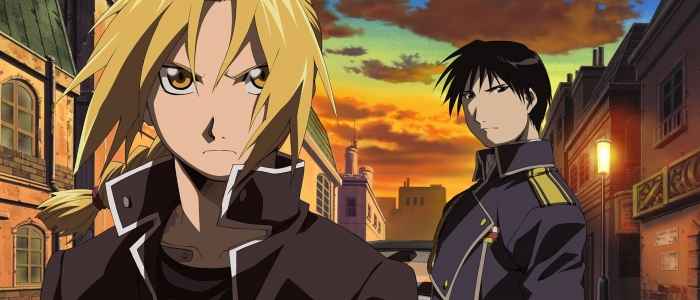
Full Metal Alchemist is one of the most acclaimed anime and manga franchises of recent years. One reason for this is the series complex take on a variety of real world subjects. This ranges anywhere from racial tensions and military dominance in government to man’s place in the natural balance of the universe. The series was not afraid to tackle many social, psychological and philosophical questions. One prominent theme within the manga and both anime adaptions is the struggle between science and religion. Here we shall explore the stance of the show on both methods of exploring creation.
Scientific Principles in Alchemy
In this world, science has essentially taken the form of alchemy. Alchemy itself is a fusion of scientific principles and magical properties all based around one basic concept, The Law of Equivalent Exchange. This law states that to gain something of value, something of equal value must be lost. Essentially that means that in alchemy, and in life, an alchemist cannot create something without losing something in return. This itself is based around the law of matter stating that matter cannot be created or destroyed but merely changes form. This philosophy extends to the Elric’s view of the world as well. In an attempt to bring their mother back to life, they assumed that a soul merely required some DNA and physical properties. This caused the ritual to go wrong, with the Alphonse losing his whole body and Edward losing several limbs. What they received was a deformed monstrosity which barely resembled their mother. This mistake would be the primary motivating force for the brothers to seek out a way to reclaim their bodies.
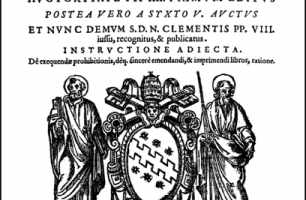
Father Cornello and Abuse of Power
The first episodes of the anime opens with a situation which questions the place of religion in society. The two main characters, Edward and Alphonse Elric, have traveled to an isolated city in search of the Philosopher’s Stone. This stone is a legendary device which supposedly allows skilled alchemists to bend the laws of alchemy. They have been drawn to this city by rumors of a religious leader named Cornello, who supposedly is using the powers of a god to perform miracles. These include bringing people back from the dead. Edward suspicions are confirmed that Cornello is using the a version of the stone to perform such miracles. Essentially, these miracles are simply alchemy in disguise. Cornello is also using his influence to create a religious following and make followers out of the townspeople to worship him as a prophet of sorts. Edward and the audience soon learn that Cornello may not be as well meaning as he first appears.
Walking into a search of the supposed sun god, Edward encounters one of the villagers. This is a young woman named Rose who is a devoted follower of Cornello’s. She is so utterly devoted that she believes Cornello’s promise that he can return her lover back to life. Edward scoffs at this, claiming Cornello must be a fraud and that her beliefs are foolish. Rose retorts a common argument regarding faith, that science cannot disprove the existence of an omnipotent creator. Edward’s own beliefs are heavily rooted in science, being alchemy in this case, and gives her an example of hard reality based on scientific observation. He explains the chemical breakdown of a human being. Drawing for his own experiences trying to play play god, he explains that some laws cannot be broken. Therefore, Cornello can’t simply create these miracles from nothing. Edward explains he is simply using some form of alchemy to change matter.
Edward sees Cornello and by extension organized religion, as a massive deception to the uninformed and uneducated populace. To him, all existence can be explained through scientific observation and exploration. Interestingly, Rose retorts back that there is a great deal that alchemy does not know. Science still doesn’t have all the answers. If Edward completely believed in the laws of alchemy, we even both finding a way to bypass them?
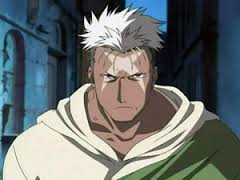
Scar and the Religious Jihad
The series does not shy away from that fact that both science and religion have very apparent dark sides. The main vehicle for this the Ishval conflict. The nation of Amestris, whom the Elric brothers serve, once had a major conflict with the nomadic Ishvalans. This war resulted on destruction and death on both sides and nearly led to the genocide of the entire Ishvalan tribe. Drawing possible comparisons to recent events, the Ishavaln conflict is similar to decades long conflicts within the Middle East. The Ishvalans themselves have a society and religion similar to many Arab cultures. One refugee named Scar has taken it upon himself to wipe out all state alchemists within Amestris.
Scar claims that alchemy perverts the natural order, much like some religious fundamentalists claim science may be an affront to God. Scar commits many brutal murders in the name of his religion. In an encounter with Edward, the young alchemist points out the hypocrisy of using religion as an excuse for vengeance, even if it contradicts the principles of Scar’s own belief system. What’s worse, Scar is using a form of alchemy to exact his revenge. This is a commentary on the often contradictory nature of religious based terrorism. Murder is typically not condoned in most religions, yet some would hide behind a religious cause an excuse to break such creeds. Even so, Edward is unable to refute that fact that science, in this alchemy, led to the near destruction of an entire race of people. A simple comparison to the use of the atomic bomb on Hiroshima during World War II is the most obvious example of this counter point. Both sides can easily be used for evil just as much as a force for good.
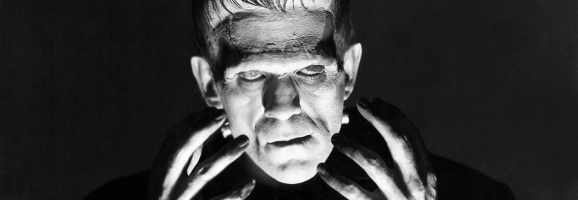
The Nature of the Homunculus
One crucial aspect of this balance between religion and science lies with the villains of the series, the Homunculus. These creatures are partially human and created by alchemists who attempt to bypass of the laws of alchemy by performing human transmutation. This refers back to the mistake the Elric brothers made with their mother. These creatures are a constant reminder of their failure. However, it is worth noting that for a scientific principle that is established as being unbreakable, many alchemist seem to be looking for loop holes. This reflects the darker side of science. It even suggests that there are simply some things mankind may not be ready for.
A similar idea was posed in Mary Shelly’s Frankenstein. Dr. Frankenstein believed he could conquer death and overreached his authority. Much like the Elrics, he attempted to play God by assuming he knew everything he needed to know. Much like Frankenstein’s monster, the homunculus are perversions of mankind’s attempts to break the boundaries of science. In this case however, the results were somewhat dire. Whether or not these creatures are considered fully sentient is left up to debate among the characters. It is interesting that though these monsters were the product of scientific experimentation, some of them consider the possibility of humanity. The concept of a soul for instance, is the something these creatures strive for. The source of the soul is obviously more spiritual in nature which may find it’s roots within the source of alchemy itself.
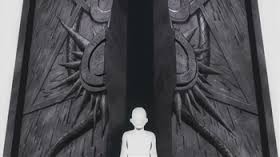
The Gate and The Truth
The primary idea behind Full Metal Alchemist is balance. So it is fitting that the series would have a balanced view on the opposing view points of science and religion. As many scholars have pointed out, science and religion have many of the same goals. They just have different ways of approaching them. Ultimately, both deal with defining the concept of existence. One goes by observation and experimentation, while the other deals with ritual and faith. Alchemy in this universe is steeped in scientific observation but actually has many mysterious mystical properties. Whenever an alchemy ritual is performed, it opens up a mysterious portal known as The Gate.
This strange dimensional ripple seems to be the source of an alchemist’s power, allowing him to transform matter. What this dimension is exactly is surprisingly unknown despite an entire scientific society basing it’s beliefs and culture around it. Much can be said for many properties that scientists use in the real world. Many observations are made to explain why certain things are the way they are. Still, many things are still left unknown. For instance, a common question a child may ask it, “Why is the sky blue?” Scientists can explain the chemical reactions in our atmosphere which produce a blue sky. However, they can’t explain why it would be blue rather than red or green. There are simply some things some definitive answers we do not have. Morality for instance, is not something easily defined by science. Such answers are provided to many people through religion.
The spiritual nature of Full Metal Alchemist is equally as prominent as scientific observation. After all, the series itself is based around almost magical concepts of alchemy. This in itself suggests that religion may simply be science that have elements of science we do not yet understand. The mysterious nature of The Gate as the source of alchemy is an interesting enigma. It is the source of scientific power, but contains a mysterious unknowable force. One comparison could be made to observations about black hole and worm holes in deep space. Science has some idea regarding their purpose and make up, but there is still much we do not know about them at the end of the day. What the series suggest it is may offer more religious connotations than scientific ones however.
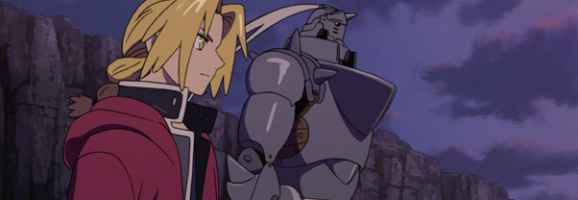
When Edward enters The Gate again, he realizes it is something alchemists refer to as The Truth. This dimension is higher plane of existence where all knowledge and matter converge at once. It is suggested that the source of life, and more specifically the human soul, can be found within this place. This Gate is the source of all knowledge. It is the source of life. Even so, it is still very much beyond human understanding. As the series concludes, Edward learns that his simply part of a much bigger whole, and his use of alchemy is but one way of taking part in a much grander design. The conclusion of the series, particularly Full Metal Alchemist:Brotherhood seems to suggest that neither view point is wrong, there is simply much more to learn. Mankind still has a long way to go. Science and religion are simply two paths to the same ultimate knowledge of self-discovery.
What do you think? Leave a comment.

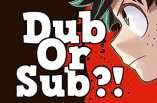


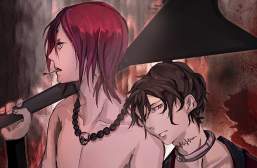


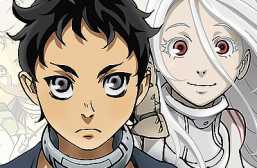
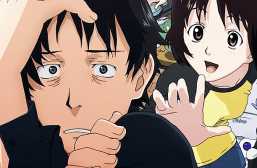
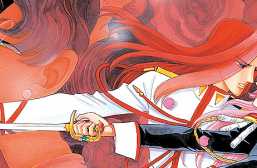
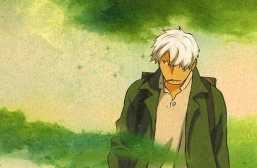
I am a huge fan of FMA, and I have to say that you nailed this piece. This is a topic that I’ve often thought about with this show because of my background in both science and religion and it was wonderful to see the same discussion on this site. The organization and analysis were top notch, and really emphasized that this meld of science and religion continued from beginning to end in the series. Most importantly though, was the conclusion in the anime that neither side is wrong or right, which perfectly mirrored your own conclusion. Nicely done!
Thank you!
I will be checking out the FMA anime and manga soon. Gotta say that the series looks very interesting and I hope it fulfills my friends recommendations to watch it.
FMA and FMAB are two of my favorite animes, and your article perfectly highlights why. I found it very interesting that you combated Ishval to the Middle east; I’ve never thought of it that way before. I’ve always interpreted as the Ishvalins represented Native Americans, but I’m sure it can be interpreted in many different ways.
This has gotten me into anime, and none have beaten it.
Wow great read. This is a fantastic anime and one I highly recommend to any anime fan!
The religious symbolism in FMA can be taken about as seriously as in Evangelion. It’s there, but it’s really just a reference to western culture and alchemy itself. It was really cool that Arakawa actually used real alchemic symbols as a way to draw the circles, but they’re never used in any sort of context that promotes nor demotes Christianity. However, the manga/show does however support the idea of following your own path and not sticking to a creed such as the Lior episode–or the entire original series.
Precisely! That’s one of the things many people mistake especially about EVA. It’s clear that, just like the terms taken from psychoanalysis, biology, etc. like destrudo and central dogma, the religious symbolism is there because it’s cool and for metaphorical purposes. Central dogma, for instance, is not a place, but a core principle of biochemistry, but Nerv’s Central Dogma is very aptly named if you take words at their face value and forget the biochemistry connection. Much like Touka-Kouka. Arakawa certainly uses the law of equivalent exchange much like the Kantian principle of universal order, that is, the order of the physical universe reflects the moral order imposed on the universe by God. Of course in the anime it makes even less sense than in Kant. Take an example that Greed gives: why are different people who put the same effort to achieve something rewarded differently? According to the law of equivalent exchange they should be rewarded the same. Winry magnificently demolishes this idea when she says to Ed in the last episode: “Why do you alchemists have to make everything so complicated? You give me 50% of your life and I give you 50% of my life? You can have all of it!” That is, she’s saying that she loves Ed unconditionally and wholly and that physical principles have nothing to do with that. Saying Nina’s death was unfair because no one benefited from that death in the same measure as the value of Nina’s life is just complete nonsense. It was unfair because a little child was brutally murdered by her father (Scar didn’t murder Nina, he released her from a kind of hell). Would that be made fair by an equivalent exchange of another 3-year-old kid being resurrected by her death? No, of course not!
I can’t comment in detail, as I’m a stranger both to Fullmetal Alchemist and to the study of religion. But from what I understand, FMA presents organised, montheistic religion in a bad light while being happy with religion as a personal code/set of beliefs. The obvious next question is ‘Is what FMA says about religion right?’
I think one of the biggest themes in Brotherhood is the sanctity of human life.
Brotherly love is presented beautifully in Brotherhood.
There is certainly enough food for thought here. While there is a lot of overt religious overtones, some of the more subtle ones are easy to miss…
Accidentally read this article of yours! Actually, this is what my thesis is about. Your interpretation is good. I will reference it in my thesis.
I’m honored. Glad it was helpful!
An avid reader of the FMA manga, I stumbled upon Brotherhood on Toonami and, form there, I was hooked.
I’ve just been recently introduced to anime by some friends of mine and I’ve managed to come across the 2003 series, Fullmetal Alchemist. And I can say I was astounded at the amount of quality this work contains. I’ve been an anime fan since.
FMA since its introduction to the manga/ anime world, has stirred up many conversation and discussions just like this article. Even 14 years later it still leaves a very lasting impact casual viewers and hard core fans a like. The only thing I would have liked to see further in this article is a comparison between the Manga/Anime in relation to our own world and its view of religion and magic. I have strong belief that the symbolism and ideas being explored in FMA strong reflect our own history.
Loved reading this and I found it to be a very interesting topic since religion and science are often both seen as separate entities and can’t be considered similar. Would love to discuss all the similarities FMA brings up throughout the series.
I started watching anime only in 2011-2012, introduced to Naruto. I never really knew any anime besides Naruto, Dragon Ball, One Piece and Bleach, even though I only watched Naruto. Then I watched Fullmetal Alchemist: Brotherhood, in 2013, and it quickly became my fav.
Brotherhood is a much better developed, logical, and interesting story than Fullmetal Alchemist.
Everything about this anime is amazing.
This series is part of my soul and I’m a anime critic, I don’t say that about a lot of animes, not even Cowboy Bebop and that is one of my 10s.
Something I’ve always admired about FMA and FMA:B—and it’s something that not a lot of people mention—is the diversity of its characters.
Also to mention the fact that in brotherhood toward the end of the seris hohemiem and that girl+ al seem to use the satanic pentigram often used in withcraft and the study of satanism.
Good read. I enjoyed your comparison of FMA with Mary Shelly’s Frankenstein. The section on Father Cornello though was a little too much episode summary and not enough analysis. Other than that though, good job.
Great read. Something I think is amazing about FMA and FMA:B is the depth that it goes into. Alchemy is viewed as a science, but what is magic but not science we don’t understand?
This is the best anime I have scene close to the Cowboy bebop and Neon Genesis Evangelion
I will make it short and simple. Fullmetal is THE BEST anime ever made.
The manga was pretty good, but brotherhood just ruined the pacing and tone. And even in the manga I had a problem with one dimensional villains as opposed to what we had with the homonculi in 2003.
I love FMA and was gutted when it finished. This has given me something to think about! I may HAVE to watch them all again with my mind on symbolism.
Edward states in the Japanese manga that he is an Atheist, but they decided to be less offensive by translating it as “I’m not the type of guy to believe in that stuff” or whatever.
The fact that he saw the face of “god” and refuses to acknowledge it as such is really a fascinating statement. Though, I can’t help but think it isn’t god at all. The god we see in brotherhood/manga is merely a physical representation of everything all mashed into one–so i guess it is in a way… But certainly not the Christian god.
Hiromu Arakawa specifically said “there is no Christianity in the world of FMA” despite the real world alchemic symbolism which, in turn borrowed from Christian and Jewish culture.
Yes, certainly. The “Truth” (the god of the series) is not even an individualized entity, it’s actually the universe and everything in it. That’s why it charges a price for everything it gives in return: it’s the law of conservation of energy. For instance, Mustang loses his eyesight DESPITE having been forced into making a human transmutation. Why? Because his volition doesn’t matter to the Truth, only the process itself matters. Not only there’s no god in FMA_B, religion itself is absent except as a set of beliefs people adhere to. That’s why Ed has no reason to stop being an atheist just because he came face to face with god. It’s like starting believing in god because you discovered the law of universal gravitation.
Mustang is best character, his showdown with Lust is pretty much the greatest moment in the entire show.
Yes, I loved it. However, I also like his showdown with Envy almost as much, except for the stupid part where the others don’t let him kill Envy because that would “taint his soul” or something. But that’s both for karmic reasons and, especially, because envy was necessary for the plot.
Never liked Brotherhood; I love it.
Fullmetal alchemist Brotherhood is one of those “once in a long time” kind of anime. What I mean by that is that it not like other anime that you get to watch and enjoy and then slowly forget about or one of anime that get ranked high on a list because of the hype around it. It’s really an anime that deserves your attention. Thank you for writing about it.
I would say alchemy is more a philosophy than a religion because alchemists don’t prescribe to the notion of all powerful deities.
In the show, especially Brotherhood, it’s not even a philosophy, it’s downright science (of course it’s magic when compared to the real world, but not in the world of the show).
I am a fan of both animes, Brotherhood, and the original.
This was very interesting, it’s hard not to notice all these in the anime but it’s tough to figure out what they mean and whether the creators intended a symbolic meaning by using them.
I always felt comparing religion and science in FMA (first anime), was something of a red herring in that the show never was terribly vested in that theme.
To me it it was always more about what would you be willing to sacrifice to get what you believed you wanted. That was the temptation of the philosopher’s stone and the basis for “equivalent exchange.”
Ed & Al wanted their mother back. (They gave up their bodies) Lust wanted to be human. (She commits so many murders) Scar wanted to clear his soul of vengeance. (He undermines his beliefs) Dante wanted immortality. (She gives up her humanity) Mustang wanted to atone for Ishval. (He ruthlessly pursues power) Shou Tucker wanted to prove he could create a real chimera, (Sacrified his daughter) etc.
In their pursuit
of the stone. The brothers ultimately come to grips with the limitations of hope. Even the simple wish of getting back what they lost is one that will never entirely come true.
In this sense, it takes a somewhat “Catholic” view of nature in so far as it acknowledges the nature of the absolute (i.e. things like the philosopher’s stone) is beyond the pale moral judgment as possessed by any individual.
Brotherhood takes a different tack though, where the ultimate truth is humility. This is Socrates’ apology, that in an ignorant society, self-awareness begins with recognizing one’s ignorance. Yet, for this recognition, Ed is rewarded.
In fact, really just about everybody is rewarded by the end. The good get what they wanted (That includes Greed), the wicked are punished, and the misled/misguided are given a second chance. It’s a kind of teleology more in tune with a “Protestant” take on religion, because our path to salvation/the-good-life lies within our own hands.
I could’t put my finger on why I enjoyed the story when I first watched the FMA series as a kid, and I still find myself lost in the world and its philosophy. This is golden! Thank you.
I’m glad I’m not the only one who thought of this topic in regards to FMA. I always saw the Ishvalans are a sort of mixture of different real-world peoples, not necessarily one or the other. I consider that part a little more fluid than others. I like the way you portrayed the Gate and Truth, I saw it in much the same way myself when I saw it. It really shows FMA’s journey of discovery in terms of science, faith, and a quest for greater knowledge.
This is an interesting comment on science vs. religion, which is definitely an important aspect of FMA, and particularly of FMA:B.
I find it interesting that you chose to compare the Ishvalans to the Muslim people, not because it’s a totally inaccurate comparison, but because I’ve always considered them a closer analogue to the Jews. Given the WWII-esque setting of FMA, their extermination by a literal Fuhrer, their demonization all scream Holocaust to me. However, you’re right that Scar more closely echoes the religious extremism of Jihadi Muslims, and that he’s a comment on hypocrisy. That being said, he also considers himself an outcast of his own people, and believes himself a traitor to both them and to his God, so while he hates alchemy and believes it’s a scourge, his quest is as much personal as it is religious. He’s a very complicated character, just as much as all the others, and I don’t think he should be taken purely as a parallel to Islamic terrorism, particularly given when and where the manga was written and conceived (the first volume was published early in 2001, and it’s Japanese, so probably lacking the American terrorism panic, but it’s possible).
I am in agreement with you. I think the similarity in skin tone creates a bias of thinking of a jihad.
No other Ishvalans were part of Scars vengeance plot. This really want a Jihad but the work of a lone wolf who wanted to get justice/revenge for what his people were Pitt through. He wasn’t killing random people on the street he targeted the perpetrators of the genocide.
If the show was shown from his point of view he would have been depicted as a eastrward hero not a jihadist.
I wouldn’t even go that far. I don’t believe Scar thinks he’s a hero- I think he’s just doing what he has to do. He’s hurt and angry, but he’s also cast away his name and made himself an outcast. He’s fighting a fight he feels is righteous, but I don’t think he thinks much of himself beyond that.
I don’t think Scar would consider himself a hero either but I do think an anime based on Scars point of view would cast him as somewhat of a tragic hero. I don’t think he has any illusions about what he is doing but he definitely is different from the jihadist theory.
Great article!
“One crucial aspect of this balance between religion and science lies with the villains of the series, the Homunculus.”
The plural of homunculus is homunculi (like alumnus and alumni, pegasus and pegasi, etc.)
Loved this since I first began to catch it on adult swim. Really liked the conflict between science and religion the alchemists go through in the series.
Loved this anime, and your insights here really made me think!
That is definitely the heart of the series, the idea of balance. It’s great that you mentioned spiritual awakening too though, because that’s a reoccurring theme in both series. This idea that everyone is searching for some sort of enlightenment or redemption, which are things more spiritual in nature. Though that might be my main qualm with Brotherhood. Brotherhood’s villain (I won’t spoil), as a character, despite their origin, was the only one to really defy this theme (which made them a great villain). But the original series’ antagonist worked better within the theme and really showed how far equivalent exchange could go. Even citing historical examples.
This is a good article that examines the themes well. If there’s an issue with it, it’s that it doesn’t always make it clear when it is talking about the 2003 anime, and when it is talking about the manga/Brotherhood. While the two contain similar themes, they don’t hit all of the same plot points–for instance, the Homunculi being the result of failed human transmutation is true only in the 2003 anime, while Edward giving up his Gate is true only in the manga/Brotherhood.
I don’t think the article needs a serious rewrite or anything, and again, it looks at the themes quite well. It might simply benefit from some minor edits to indicate which adaptation is being discussed at which point.
like roy,he can create a flame by flicking his fingers similar to the process of combustion in matches.
Just an essential disagreement about both the function and goals of science: science is not interested in explaining why things are was they are, not in the sense that religion does. The Why in religion is related to reasons in the moral sense: things are as they are because god or the gods wish it to be so and in religions like Christianity this serves the moral purpose of human salvation. In science, why is solely related to explaining the mechanics of things. So, why is the sky blue instead of green or red? Because the way our atmosphere is constituted causes blue to be separated in the upper atmosphere from the other colors of the spectrum and thus be visible individually. What is the meaning behind that? There is none. The universe is chaotic and existence has no reason or purpose beyond merely existing. That is the main reason Science and Religion are complete opposites: the latter looks for meaning, the former just wants to know how things work. I know many people in the philosophy of science will disagree with me, but as I mostly disagree with them and with philosophy in general, that’s ok.
I think what is under appreciated is the interaction that the two have.
Ishvala is obviously an analogue in the series for the Abrahamic God, but I’m curious about whether or not you’ve considered the specific religion “The Truth” in FMA seems to derive itself from: namely Buddhism.
Would you mind if I did a similar post using a similar format but for the Neon Genesis Evangelion?
FMA: Brotherhood is one of the deeper animes out there to watch. There’s so much meaning and different principles and teachings in this anime that discussing it with others is always fun to do.
This is a highly interesting topic, and is one that I would love to share with the members of my school’s Anime Club sometime in the future. It was very well organized and thought out, with references that most anyone can follow or at least easily discover. There were a few grammar mistakes and places where the phrasing was awkward, but overall a very engaging piece. As far as FMA goes it is a great series that totally brings up all of the mentioned topics, and more! I know several people who would love to read this.
I’m a big fan of Fullmetal Alchemist. You gave a great overview of the different religions that Hiromu Arakawa used to help fashion such a creative, engaging world. Thanks for the read!
Excellent work on an engaging topic. It’s fitting to mention Frankenstein because Victor’s creation of the Monster occurred while he studied both alchemy and modern science and sought to defy natural death.
Thank you!
Nice article. I just watched Full Metal again and was captivated by its deep approach to this duo dilemma, but also irritated at its abrupt childish interruptions. If I were you I would have written more about how they specifically approached the topic of alchemy in a real life setting. Good work though.
Full Metal Alchemist is my all time favorite anime. I’ve watched it multiple times and it never gets old! With that said, I think you raise a lot of interesting topics that I only ever thought of briefly but never in depth.
Nice read! In the end, as suggested, the scientific and religious aspects walks side by side to one and final goal, or as one and final path. Having both is part of the development and part of how we grew up as society aswell.